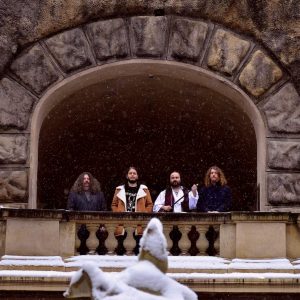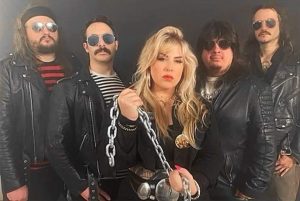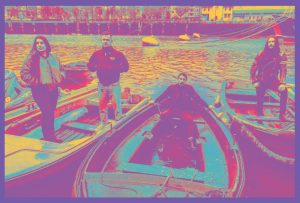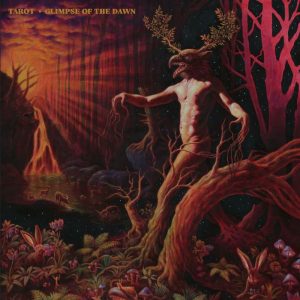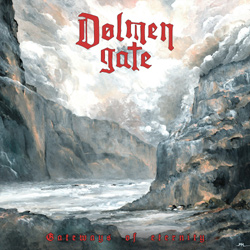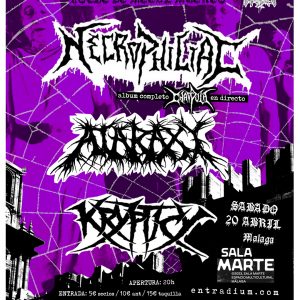MELECHESH (Eng.)
– Hello and first of all thanks for taking the time. What are you into right now?
We’re still in the process of promoting the album and getting ready for upcoming tours. Very busy and very active which is great!
– «The Epigenesis» has just been release; wy did it take you so much time in creating it? Though I think we get used to that in those 3 years that passed between «Sphynx» and «Emissaries». What were you up during that time?
We did a European tour, played many festivals and took our time to think of the new direction to take, whether conceptually, lyrically, musically and visually. You just have to feel ready to record a new album. If we rushed into the Studio after Emissaries we would have recorded the same album twice. Why would we want to do that? We owe it to ourselves and to the people who love our music to move forward. At the end of the day, we do this because we love what we do; it’s the journey that makes it worthwhile so you better think of where you’re heading to fully appreciate it.
– And how has been the feedback for the album?
So far it’s been great. We already got some eight cover stories and the album has been album of the month in many respectable magazines.
– «Emissaries» got an amazing response and I guess you’d like to meet your fas expectations so, was harder the creative process for this new record?
The more albums you release to more people will hold you “accountable” to the standards you set. Since Sphynx people have been telling us that we wouldn’t be able to top this album and it just got harder with Emissaries. But you have to ignore it and allow yourself to think of new things, integrate new influences and incorporate elements you did not use before. You have to create new expectations instead of simply building on older ones. It’s not always easy but so far it’s been working out for us!
– And now that I’ve touched your previous album, if I remember properly there were a few problems while producing it; how was it this time?
Basically we gave our album to a top-notch producer to mix it, he did the world’s most horrible job and took the money. This cost the label a lot of time and money (Emissaries is the second most expensive album for Osmose productions after Immortal’s Blizzard Beast) this delayed the album by some 8 months. Nothing of the sort happened this time given the amazing and professional staff at Babajim studios.
– Though you’re currently living in Holland the CD was recorded at the Babajim Studio in Istanbul (Turkey); why did you decide so?
For many reasons, first and foremost it’s an amazing studio, with amazing equipment and Grammy award winning staff. Istanbul as a location is also extremely important, It’s very inspiring as a place which is essential when you record an album. Also the resources there are amazing especially if you are looking for guest musicians. And finally it’s a great way of making a statement: why go West when you can East to record a metal album? There are a lot of things happening in the middle east when it comes to metal and people are not paying enough attention to it.
– «The Epigenesis» is your first album with Nuclear Blast, could you please explain us how did you hook up with them and your feelings about that label? I bet there were other labels as well interested in signing with you when your contract with Osmose was over.
There were many labels that wanted to sign Melechesh after our contract ended with Osmose, Nuclear Blast was one of them. For us, we wanted a label that would allow us to go forward, push Melechesh to new territory and offer a fair deal. We got both with NB And so far it’s been going very well.
– Even still having your own trademark, I felt like with this album you tried to expand your horizons and create a more varied album…
Yes, it’s always about expanding and exploring without alienating the listener (or ourselves for that matter).
– For example, you have used some more traditional instruments. Talk us a bit about that, please, and what instruments did you use (as well as a little «introduction» of them, since some people won’t know).
Our goal since day onewas : not sample traditional music but re-create it with distorted guitars and pounding drums. We had instrumental tracks but the that’s it. This time we used more traditional instruments. Being in Istanbul made this easier and possible. Among the instruments we used are the Yayli Tanbur which is bowed luth from Turkey, it’s a very old Ottoman instrument and we had the privilege of having the famous Turkish Cahit Berkay play it on our album. We also had the Tar which is an Azeri/Armenian plucked luth, the Indian sitar, the baglama saz (the most typical Turkish luth), the persian santur (Dulcimer) a lot of different percussions. This does not make the album a “folk” metal album as we are still very careful about how to balance all these instruments with the rest of the tracks.
– Is it easy to bring all those mediterranean elements into the studio?
In a way it is because many of the guitar riffs are written with these instruments in mind. But it’s not always easy to mix it into the texture and sound of the tracks. Basically all this stuff comes at the very end, they are the “effects” that just add a final layer to the tracks. Now when it comes to the purely instrumental tracks, yes it is very easy and natural especially since we play these instruments (on the album I play the Baglama saz and some percussion while Ashmedi played the Sitar).
– Your lyrics have always been about sumerian and mesopotamic matters; why? I guess it has something to do with your roots…
Well at the beginning it was about our roots. We were in a scene that was starting to explore all these pagan 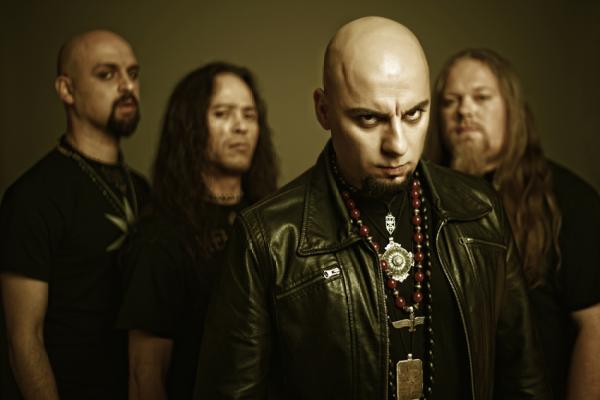 heritages (Celtic, Greek, Viking) and we wanted to have our own say. But it doesn’t stop there. It’s just a very inspiring subject which speaks to many people who do not have these roots. For us, Mesopotamian mythology and its esotericism is the language we find the most natural and most inspiring with which to talk about all the occult, metaphysical and existential themes you find in Melechesh
heritages (Celtic, Greek, Viking) and we wanted to have our own say. But it doesn’t stop there. It’s just a very inspiring subject which speaks to many people who do not have these roots. For us, Mesopotamian mythology and its esotericism is the language we find the most natural and most inspiring with which to talk about all the occult, metaphysical and existential themes you find in Melechesh
– Both your sound and lyrics are quite original for an extreme Metal bands, they’re not so many bands doing this and that good. Could you consider is your music a challenge for you and your listeners?
Actually I never get it when people talk about our music as being “complex”: we’re not playing technical jazz metal. The rhythms, grooves and sounds we take from middle eastern music are actually very primal and can speak to all. It has the basic groove that can make you headbang and mosh. And it’s still extreme metal. But we do give the music a lot of thinking and there is a lot going on so in a way it can be challenging but that’s why we do it: to challenge ourselves and others.
– You were raised up in Jerusalem (though you’re not from Israel) and some years ago move to Holland. So, why Jerusalem and why Holland?
Ashmedi and I grew up in Jerusalem (I lived in Bethelehem) and in 1999 Ashmedi moved to Holland and I moved to the North of France (which was 3 hours from Amsterdam by train). Why Jerusalem? You don’t really have a choice as to where you are born do you? We were fortunate enou
gh to grow up in a very multicultural environment where we had friends from all over the world. So in a way we knew a lot about the world and its differences even before leaving. As for Holland and France, well there are many reasons that push to go to a place: the problems we faced back home (the problems any non Israeli can face in Israel), education, relationships, work, etc.
– MELECHESH started in Israel back in 1991. What are the differences between having a Metal band there and in The Netherlands?
The band started in 1993-1994. Starting a black metal band in Jerusalem at that time was an amazing and a unique experience altogether. We of course faced more hardships than our European counterparts; not only are we a black metal band in the center of the holy land but we’re also playing metal in an area that is not considered to be part of the metal world. So you get less opportunities, less chances of getting any attention, no touring… All these hardships made us who we are and in a way we were lucky to pursue them by moving to Europe.
– And, finally, are there any tour plans to promote the album? Any chance of seeing you in Spain?
Well we have a short album release tour at the end of November in the Benelux, Germany and France; then we tour Europe with Nile in January/February and then the US in March/April. So far Spain is not on the list but I hope we will be able to make it there soon enough.
– That’s all. Thank you once more for your time and good luck with the albu. If you want to add any final words to the interview, it’s your turn.
Thanks a lot for the interview and “Salud” to our fans in Spain!
